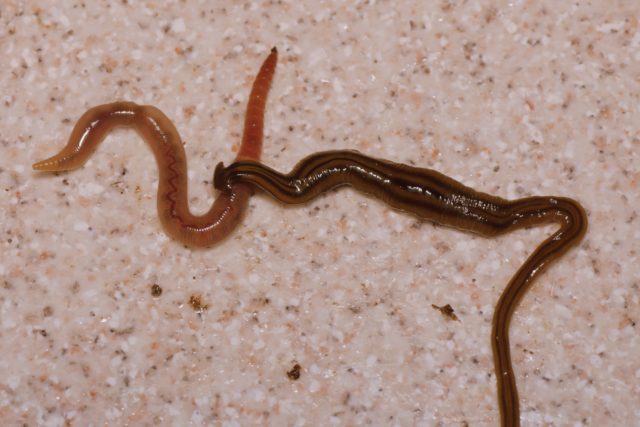
A tropical monster up to a foot long that preys on earth worms has colonised an area of southern France, scientists have revealed.
Several species of giant hammerhead flatworm are thought to have been living there for more than 20 years.
One of the nightmarish-looking beasts was also reported in the UK in Victorian times – although confined to a botanical garden greenhouse.
The invasive creatures cannot tolerate freezing conditions, so are unlikely to survive a British winter outdoors.
Researchers studied photos, videos, and captured specimens of the flatworms collected by members of the public.
They were “amazed” that such enormous invaders could have escaped attention in a European country for an estimated period of more than 20 years.
In total five species of hammerhead flatworm were reported in urban areas of southern France, including two “giants”, Bipalium kewense and Diversibipalium multilineatum.
B. kewense is known to have reached the UK. In fact it was named after London’s Kew Gardens after being discovered in a greenhouse there in 1878.
Lead scientist Professor Jean-Lou Justine, from the Museum of Natural History in Paris, France, said: “The name of Bipalium kewense means in Latin ‘from Kew’. The species was described from specimens found in the famous Kew Gardens.

“So, yes, hammerhead flatworms are present in UK.”
A hotspot for the creatures was identified around the city of Bayonne on the Atlantic coast of France, which has the kind of mild, moist climate in which they thrive.
Prof Justine’s team wrote in the journal Peer J: “We received several reports by citizens mentioning dozens of specimens in their gardens.
“In some cases, citizens repeatedly reported high numbers, even when the worms were removed by hand and destroyed.”
The giant flatworms originate from Asia but have found their way around the world. However, until now they have not been scientifically studied in Europe.
Because they eat other animals that live in the earth, including garden-friendly worms, they are considered a potential threat to diversity and soil ecology.


Comments: Our rules
We want our comments to be a lively and valuable part of our community - a place where readers can debate and engage with the most important local issues. The ability to comment on our stories is a privilege, not a right, however, and that privilege may be withdrawn if it is abused or misused.
Please report any comments that break our rules.
Read the rules hereLast Updated:
Report this comment Cancel